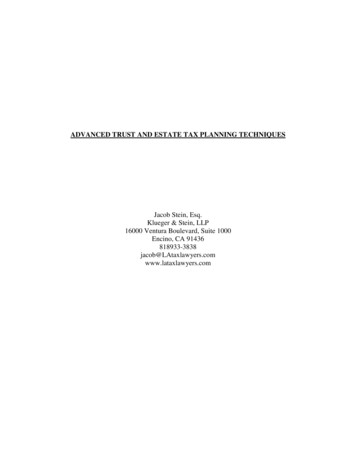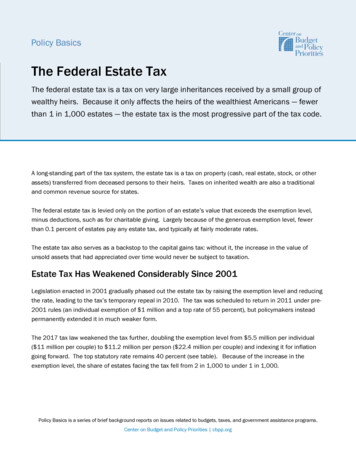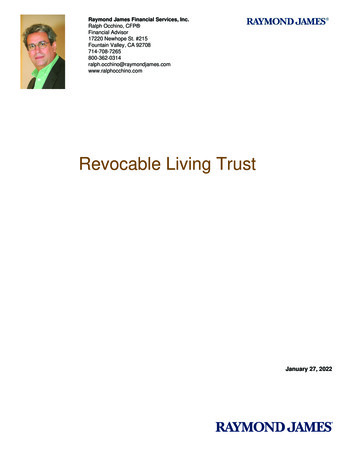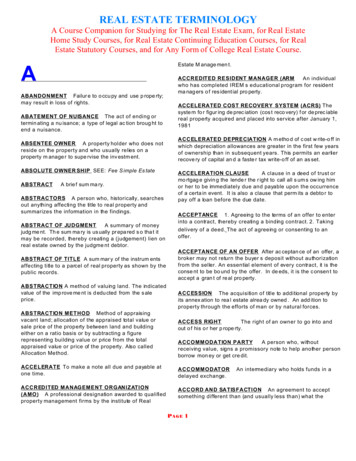
Transcription
ADVANCED TRUST AND ESTATE TAX PLANNING TECHNIQUESJacob Stein, Esq.Klueger & Stein, LLP16000 Ventura Boulevard, Suite 1000Encino, CA yers.com
Table of ContentsI.Advanced Estate Tax Techniques . 1A.Self-Canceling Installment Notes. 11.Overview . 12.Advantages of SCINs . 13.Disadvantages of SCINs . 34.Other . 3B.Defective Grantor Trusts . 51.Possible Benefits of Defective Grantor Trusts . 52.Achieving Defective Grantor Trust Status . 8C.GRATs . 111.Understanding Section 2702 . 112.Exceptions to 2702 . 123.Calculating the Gift Tax . 134.Estate Tax . 145.Income Tax . 15D.Residence Trusts . 161.Overview . 162.Personal Residence Trusts . 173.Qualified Personal Residence Trusts . 174.Income Tax Aspects of Residence Trusts. 185.Estate and Gift Tax Aspects of Residence Trusts. 186.Practical Considerations . 19E.Family Limited Partnerships . 211.Code Section 2036 . 212.Court Cases on 2036 . 213.Structuring FLPs . 284.The “Gift-on-Formation” Attack . 29F. Unified Credit . 311.Marital Deduction . 312.Outright Gift . 36
I. Advanced Estate Tax TechniquesA.1.Self-Canceling Installment NotesOverviewA self-canceling installment note (a “SCIN”) is in essence an installment note payable withreference to someone’s life expectancy.1 The use of the words “self-canceling” denotes the factthat the note is automatically canceled by its own terms on someone’s death (i.e., once the sellerdies, the buyer has no continuing obligation to keep making payments). SCINs are taxable muchlike other installment sales under Code Section 453.2.Advantages of SCINsSCINs enjoy many estate tax advantages, and also enjoy some income tax planning advantages.(There are certain nontax advantages as well. For example, the seller would not have to continuemaking payments past the term of the note. Compare this with a private annuity where the sellermay have to make payments for a much longer period of time than the life expectancy of thetransferor.)a. Estate TaxAny sale of property in exchange for a promissory note will accomplish an estate freeze. Thetaxpayer will own a promissory note which will never appreciate in value, and the assets sold(usually to an irrevocable trust) have been removed from the taxpayer’s estate, including theirsubsequent appreciation.SCINs take an estate freeze a step further. Promissory notes that are cancelled on death are notincluded in the decedent’s estate.2 This accomplishes not just the freeze of the estate at today’svalues, it actually reduces the value of the estate.The cancellation clause must be a bona fide part of a contract, separately negotiated and paid for,and not simply a testamentary disposition.This means that a seller in a SCIN transaction enjoys the same estate tax savings as the transferorin a private annuity. The transferred asset is removed from the seller’s estate in exchange for theinstallment note that becomes worthless on death, and the future appreciation of the transferredasset is also transferred out of the estate.1Per GCM 39503, the term of a SCIN should always be less than the seller’s life expectancy. If the term of theSCIN exceeds life expectancy, it is treated as a private annuity.2Moss Est. v. Comm’r., 74 T.C. 1239. Jacob Stein, 20131
If the seller dies before reaching his life expectancy, the estate tax savings can be verysignificant. Keep in mind that the payments received by the seller on the installment note areincludible in the seller’s estate.Example. George, age 40, sells an asset worth 5 million in exchange for a 35-year, selfcanceling (on death of George) promissory note. George dies before he receives a singlepayment (he is run over by a milk truck). The entire 5 million asset is out of George’s estate. IfGeorge survived for a few years, then whatever payments he would have received under theinstallment note and did not spend, would be included in his estate.b. Securing the NoteSCINs can be secured. They can be secured with property, pledges or guarantees. 3 Securing aSCIN will not cause the entire amount of gain to be taxable in the year of sale.c. Income Taxi.Tax Consequences to SellerSCINs are subject to the installment sale rules of Code Section 453. This means that if thetransferor otherwise qualifies for the installment method (for example, if the transferor is adealer, he does not qualify), that is how the sale of property in exchange for a SCIN will betaxed. The note has a maximum selling price and is treated by the Service as a fixed paymentinstallment sale (although the note is really contingent).A portion of each payment will be a return of basis, capital gain and ordinary income.If the transferor dies before receiving all of the payments on the note, then his estate (on Form1041) will be taxable on the unrecognized gain.4Many commentators have argued that the transferor really has no unrecognized gain. A SCIN isnot payable for life, but for a fixed term, and the parties also negotiate the possibility of thetransferor dying before the expiration of the term – i.e., the transferor receives exactly what hebargained for, there is no unrecognized gain. Which means that SCIN payments are largerbecause of the risk premium, and the transferor already recognizes more gain.3Code Section 453(f)(3).Frane Est. v. Comm’r., 998 F. 2d 567 (8th Cir. 1993). In other circuits, including the 9th Circuit, taxpayer may stillargue that the gain should be reportable on the last income tax return of the transferor.4 Jacob Stein, 20132
ii.Tax Consequences to BuyerInterest payments made by the buyer on the promissory note may be deductible. Deductibility ofinterest depends on various factors, such as the identity of the buyer and the nature of the assetsold. If the buyer is a C corporation, interest should be fully deductible.If the buyer is an individual, depending on the nature of the asset sold, interest may not be fullydeductible due to various limitation imposed on the deductibility of investment interest andpersonal interest.With respect to basis, the buyer will have basis in the acquired property equal to the statedmaximum purchase price of the note (i.e., basis should equal fair market value of the property atthe time of transfer). There will be no subsequent adjustments to basis.3.Disadvantages of SCINsa. Gift TaxSCINs may have gift tax consequences if structured incorrectly. To determine whether a SCINinvolves a gift, it is necessary to determine whether the value of the transferred property equalsthe value of the installment note.The cancellation clause of a SCIN is technically a separately bargained for part of the contract.This means that first the terms of the note should be determined using the standard present valuerules. Then, the terms need to be adjusted by the value of the cancellation clause.The separately bargained for value of the cancellation feature is usually referred to as a riskpremium. Because it is not possible to change the duration of the note, the risk premium isreflected through a higher principal amount or a higher interest rate.Determining the proper interest rate hinges on first determining the value of the risk premium.This is based on the probability that the transferor will not survive to receive all scheduledpayments. The probability of the transferor surviving to receive each payment is based on themortality tables in Treas. Reg. Section 1.72-9 or the 90CM life expectancy. There is no clearguidance which life expectancy should be used. Because the regulations usually result in alonger life expectancy, that reduces the risk premium, and the use of the life expectancy in theregulations is therefore desirable.4.OtherBecause Code Section 453(e) applies to SCINs, a disposition of the assets by a related-partybuyer within two years of the SCIN transaction would cause the seller to recognize all of thedeferred gain. Jacob Stein, 20133
Finally, a SCIN would be inappropriate if the transferor would need to retain an income streamfor life. Jacob Stein, 20134
B.Defective Grantor Trusts“Grantor trust” is a term of art and refers to a trust defined in Code Sections 671-679.Sometimes grantor trusts are referred to as “defective grantor trusts” or “intentionally defectivegrantor trusts.” Both of these terms are misnomers.Some commentators have been referring to grantor trusts as defective. That implies that if a trustis a grantor trust that may result in some adverse consequences. As the reader will learn in thissection, that is not necessarily so. As a matter of fact, certain advantages may be had from thegrantor trust status. However, the term “defective grantor trust” has entered the common lexiconto refer to a trust that is grantor for income tax purposes but results in a completed transfer forestate and gift tax purposes.What then is an “intentionally” defective grantor trust, or, in other words, an intentional grantortrust? This refers to the fact that the drafter of the trust intentionally structured the trust toqualify under Code Sections 671-679. The use of the term “intentionally” in this context iscertainly a misnomer. Any grantor trust that is not so intentionally is a malpractice claim.There is a lack of symmetry in the income and estate taxation of trusts. A transfer to anirrevocable trust can be treated simultaneously as both (i) a completed transfer for estate and giftpurposes and (ii) an incomplete transfer for income tax purposes. Thus, it is possible to structurean irrevocable trust so that the assets of the trust will be excluded from the donor’s estate at hisdeath, while at the same time the trust will be a grantor trust for income tax purposes during thedonor’s lifetime. This may lead to certain estate and gift tax advantages.Grantors commonly fund these trusts through the mechanism of an installment sale or a SCIN.This avoids any gift tax issues, and transfers, at the very least, the future appreciation of theasset, out of the grantor’s estate. Using a SCIN, it is possible to transfer a lot more than justfuture appreciation out of the taxable estate, if the grantor dies prematurely.When choosing between a SCIN and a defective grantor trust, the tax adviser must determinewhether the client’s objective is estate tax reduction, income tax reduction, or both.If the sole objective is the reduction of the estate tax, then either structure can be used. If theobjective is to also incorporate income tax planning, then a defective grantor trust cannot be usedas the transaction will be ignored for income tax purposes.1.Possible Benefits of Defective Grantor TrustsThere are several benefits to defective grantor trusts.a. Income Tax Advantages Jacob Stein, 20135
Transactions between a grantor trust and its grantor are ignored - a grantor trust is a nonentity forincome tax purposes. Consequently, transactions between the grantor and a grantor trust will betreated as income tax nonevents. The Service has ruled specifically on the issue of sales todefective grantor trusts and found these sales to be nonevents for tax purposes.5 Additionally, allof the income, gain, deductions and losses of the trust are reported on the income tax return ofthe grantor, who is treated as the owner of those items.For instance, a grantor’s purchase of property from a grantor trust is not a realization event. Thismay be a major tax benefit.Example. Consider a defective grantor trust, structured to avoid estate taxation at the grantor’sdeath, holding 1 million in marketable securities, with a basis of zero. Pursuant to CodeSection 1015, the trust’s basis in its assets is the same as the grantor’s basis at the time the trustwas funded. Following the grantor’s death, the basis of the trust assets will remain at zero (theassets of the trust are not part of the taxable estate).To get a stepped up basis, the grantor can purchase the marketable securities owned by the trustwith cash. Now, the grantor will own the securities and the trust will own cash. On death, themarketable securities now get a step-up in basis, and the basis of cash in the trust obviously doesnot change. Because the assets of this trust are not part of the donor’s estate, the cash is nottaxable on death of the donor. Thus, simply by switching assets with the trust, the grantoreliminated 1 million of capital gain, without any offsetting tax cost.Similarly, interest payments on a note between a grantor trust and its grantor are not taxable tothe grantor or the trust (same would apply to SCIN risk premium payments).6 Further, thetransfer of an installment note between a grantor trust and its grantor should not constitute adisposition for purposes of Code Section 453B.7Grantor trusts are also entitled to all the deductions and exclusions that individual taxpayersenjoy. For example, a grantor is entitled to the Code Section 121 exclusion on the sale of aprincipal residence by a grantor trust.8 A grantor is similarly entitled to the mortgage interestdeduction with respect to real property owned by a grantor trust.Because the grantor pays all the income taxes, the grantor trust is essentially tax exempt.Distributions to the beneficiaries of a grantor trust are income tax free; accumulations of incomeare also income tax free. These tax-free distributions and accumulations provide thebeneficiaries with a substantial economic benefit. Moreover, and of great importance in manyplanning transactions, the grantor’s payments of income taxes on grantor trust income do notconstitute additional taxable gifts to the trust.i.Playing with Basis5Rev. Rul. 85-13, 1985-1 C. B. 184.PLR 9535026.7Rev. Rul. 74-613, 1974-2 C. B. 153.8Rev. Rul. 85-45, 1985-1 C. B. 183.6 Jacob Stein, 20136
Because assets of a defective grantor trust are outside of the grantor’s estate, the assets willreceive no step-up in basis on the death of the grantor. Consequently, practitioners mustcarefully plan for this possible downside.One way to negate the loss of basis step-up is to realize the gains of trust assets during the life ofthe settler, thus achieving basis step-up during the life of the grantor. This way, income taxeswill be paid either by the grantor or by the grantor’s estate, and not by the beneficiaries. Ofcourse, at the end of the day, this really becomes a zero sum game.A better way to negate the loss of a basis step-up is to either initially fund the trust with highbasis assets that would otherwise receive a basis step-down (i.e., built-in loss assets), or to selllow basis assets to the grantor in exchange for high basis assets like cash. Because the salewould be ignored for income tax purposes, it will simply result in an exchange of assets betweenthe grantor and the trust.Low basis assets will be transferred to the grantor and included in the grantor’s taxable estate,receiving a basis step-up, and assets that require no step-up will be transferred to the trust andoutside the estate.Defective grantor trusts usually include a provision allowing the grantor to substitute trust assetsfor other property of equivalent value. This provision causes the trust to become a grantor trustand also allows the grantor to engage in the above tax planning.ii.Using Installment SalesIt is important to understand why installment sales are frequently used as a mechanism totransfer assets to a defective grantor trust. If assets are simply contributed to the trust, thatconstitutes a gift, and therefore a transfer subject to the gift tax.If assets are sold to the trust for adequate consideration, then there is no gift and no gift taxconsequences. However, adequate consideration implies that the trust must pay consideration tothe grantor in exchange for the asset sold to the trust. The trust may not have sufficient assets topay such consideration. However, if the trust can pay the consideration over a period of time,especially with a deferred starting date, then the transaction avoids gift taxes, is ignored forincome tax purposes, and is manageable from a practical standpoint.iii.Payment of TaxesThe payment of income taxes by the grantor is an extremely important benefit of the defectivegrantor trust structure. The taxes are paid by the grantor from his own funds, depleting histaxable estate. If taxes were paid by the trust, it would deplete nontaxable assets. Additionally,the funds that would have been used by the trust to pay taxes remain invested and continue toappreciate outside of the grantor’s taxable estate. Jacob Stein, 20137
It was relatively unclear for a long period of time whether payment of taxes by the grantor wouldconstitute a gift to the trust. The Service, in Rev. Rul. 2004-649, clarified this issue as follows:1. If the trust does not have any provisions permitting the trustee to reimburse thegrantor for making income tax payments and the grantor pays taxes out of his ownpocket, then no additional gifts are being made to the trust. The income tax is thelegal obligation of the grantor who is taxed on the income of the trust.2. If the trust requires reimbursement, then there are no additional gift being made bythe grantor, but the entire trust corpus is includable in the grantor’s estate.3. If the trust provides the trustee with discretion in reimbursing the grantor for makingtax payments, and there is no express or implied arrangement between the grantor andthe trustee to that effect, then the payments of taxes will not be deemed a gift and thecorpus of the trust will be excluded from the grantor’s estate.iv.Reporting RequirementsGrantor trusts report the grantor’s share of trust income on a separate statement attached to Form1041, and have the following options for their income tax reporting requirements: (i) they canuse the method described in Treas. Reg. Section 1.671-4(a); (ii) they can file Forms 1099,indicating the grantor as the payee, and must furnish an information statement to the grantor.Foreign trusts are limited to clause (i).b. Estate Tax BenefitsA defective grantor trust is a form of an estate freeze that avoids the application of Chapter 14.For estate tax purposes, the grantor transfers an asset to the irrevocable trust and out of thetaxable estate, and in exchange takes back a promissory note. Because a promissory note cannever appreciate in value (it will usually decline), the grantor froze the value of the taxable estateas of the date of sale to the trust.c. Use with S CorporationsGrantor trusts qualify as S Corporation shareholders. As a general rule, a trust is not apermissible shareholder of S corporation stock.10 However, Code Section 1361(c)(2)(A)(i)carves out an exception for grantor trusts. N.B. – The grantor should be treated as the owner ofthe entire trust, both income and principal. While there are other trusts that qualify to own Scorporation stock (like QSSTs), grantor trusts are either to set up and administer.2.9Achieving Defective Grantor Trust Status2004-27 IRB 7.Code Section 1361(b)(1)(B).10 Jacob Stein, 20138
What provisions should a trust contain so that a transfer of assets to the trust is complete forestate and gift tax purposes, but ignored for income tax purposes?a. Power to Reacquire or Substitute AssetsPursuant to Code Section 675(4)(C), a trust is a grantor trust if “any person” holds a power “in anonfiduciary capacity to reacquire the trust corpus by substituting other property of anequivalent value.” A Code Section 675(4)(C) power retained by a grantor should not cause thetrust property to be includible in the grantor’s estate for estate tax purposes. Nor should theretained power prevent the grantor from having made a completed taxable gift to the trust.b. Loans to GrantorPursuant to Code Section 675(2), if a nonadverse trustee is given the power to make loans to thegrantor without adequate interest or security, the trust will be a grantor trust, unless the trusteeholds the power to make loans to others under the same conditions. While loans withoutadequate interest may cause inclusion of trust assets in the grantor’s estate, the power to loanwithout adequate security should not cause estate tax inclusion.c. Power to Control Beneficial EnjoymentPursuant to Code Section 674(a), if the grantor’s spouse (or any other third party) is a trustee andhas the authority to add beneficiaries, the trust will be a grantor trust. Powers granted to thespouse are attributable to the grantor for income tax purposes, but not for estate and gift taxpurposes (generally). For most taxpayers, using the spouse as the trustee is convenient and“safe.” Accordingly, granting the spouse such a power should not prevent completed gift statusfor the trust nor should it trigger estate tax inclusion at the grantor’s death.d. Power to Distribute to Grantor’s SpousePursuant to Code Section 677(a), the grantor is deemed to own any portion of a trust, the incomeof which may be distributed to the grantor’s spouse. Consequently, making the grantor’s spousea discretionary beneficiary of the trust will make it intentionally defective. The grantor truststatus will end, however, if the spouse predeceases the grantor.Making the grantor’s spouse a beneficiary also has an important practical benefit. With thespouse as a beneficiary, the trustee can make distributions from the trust to the spouse, and thespouse would presumably share these distributions with the grantor. Thus, if the grantor needsaccess to the assets of the trust to maintain a certain standard of living, this can be achieved viathe spouse-beneficiary without causing the inclusion of the assets in the grantor’s estate.e. Paying Life Insurance Premiums Jacob Stein, 20139
Code Section 677(a)(3) triggers grantor trust status as to the ordinary income of a trust if thetrustee may pay from trust income premiums for insurance on the life of either the grantor or thegrantor’s spouse. Granting the trustee the ability to pay insurance premiums with trust incomeshould not prevent transfers to the trust from being complete for either gift or estate tax purposes. Jacob Stein, 201310
C.1.GRATsUnderstanding Section 2702Whenever a grantor sets up a trust for the benefit of a family member, and the grantor retains aninterest in the trust, Code Section 2702 applies to value the retained interest at zero. If theretained interest is valued at zero, then the remainder interest going to the family member has thesame value as the asset contributed to the trust, and is fully subject to the gift tax.For example, House gifts his motorcycle to an irrevocable trust. Wilson is the beneficiary of thetrust, but House retains the right to use the motorcycle whenever he wishes, for the next 10 years.The value of the motorcycle is 15,000. What is the value of the gift made to the trust?If Wilson is not House’s family member, then the gift is computed as follows: determine thevalue of House’s retained interest in the trust, and subtract that from the value of the assettransferred to the trust. A fairly straightforward calculation of the present value of the retainedinterest, using the annuity tables, gets us the value of the retained interest.By using a trust with a retained interest, House can take an otherwise taxable gift, and reduce thegift portion significantly.When Wilson, the remainder beneficiary is a family member, Congress is concerned that Housewould use the trust arrangement to move a valuable asset into the trust, greatly minimize the gifttax, and retain the use and enjoyment of the asset. Consequently, Section 2702 was enacted toprohibit the above transaction when the remainder beneficiary of the trust is a family member.a. Who Counts as FamilyA “member of the transferor’s family” is defined in Code Section 2704(c)(2) to include (1) thespouse, (2) any ancestor or lineal descendant of the transferor or transferor’s spouse, (3) asibling, or (4) a spouse of someone described in 2 or 3.b. Retained InterestFor Code Section 2702 to apply, the settlor (or an applicable family member – see definitionimmediately above) must have retained an interest in the trust.This covers whatever interest the settlor keeps in the asset transferred to the trust.For example, Jim transfers the ownership of his car to a GRAT, and keeps for himself the right todrive the car on weekends. Because Jim used to own the car outright, he always had the right todrive the car on weekends. He has kept that right to himself, and therefore has retained aninterest in the trust. Jacob Stein, 201311
Note that while the interest may be retained not only for the settlor of the trust but also for afamily member (like a spouse or a child), the retention test is done at the level of the person whogets the interest.For example, Betty transfers an asset to a trust, with income payable to her son for his life, andthen to Julio, Betty’s friend. Betty did not retain an interest for herself, and her son, for whom aninterest was retained, did not own the asset prior to the transfer. This means that 2702 will notapply to a QTIP trust one spouse creates for another.For the purpose of this test, an interest that may be retained includes a power over the trust whichwould cause any portion of the transfer to be treated as an incomplete gift.11 An example of sucha power would be the power to change the interest of an income beneficiary.2.Exceptions to 2702There are a number of exceptions that have been carved out to Code Section 2702, including anexception for incomplete gifts,12 personal residence trusts,13 charitable remainder trusts,14charitable lead trusts15 and certain “qualified interests”. Personal residence trusts and charitabletrusts are discussed below.We will focus on the so-called “qualified interest” exception which, as you will shortly find out,is the exception that covers a GRAT.Code Section 2702(a)(2)(B) provides that Code Section 2702 shall not apply to a “qualifiedinterest.” A qualified interest is defined in Section 2702(b) as (1) any interest which consists ofthe right to receive fixed amounts payable not less frequently than annually (expressed as a fixeddollar amount or a fixed percentage of the trust corpus), and (2) any noncontingent remainderinterest if all of the other interests in the trust are those described in (1) above. Thus, bydefinition, a qualified interest includes a qualified annuity interest (GRAT), this is where theannual dollar amount is fixed in advance, and a qualified unitrust interest (GRUT), this is wherethe percentage is fixed in advance and will be applied to the corpus of the trust on an annualbasis. The requirements to qualify as a GRAT are stated in Treasury Regulations Section25.2702-3(b) and (d), and the requirements to qualify as a GRUT are stated in TreasuryRegulations Section 25.2702-3(c) and (d).Note that 25.2702-(3)(d) has requirements that are common to both GRATs and GRUTs, whichinclude the following: (1) the interest must be a qualified annuity or unitrust interest in everyrespect (i.e., an irrevocable right to receive a fixed amount or percentage annually, or the greaterof the fixed dollar amount or of the percentage amount), (2) the qualified interest must bepayable for a fixed term (can be life of the inter
ADVANCED TRUST AND ESTATE TAX PLANNING TECHNIQUES Jacob Stein, Esq. Klueger & Stein, LLP 16000 Ventura Boulevard, Suite 1000 Encino, CA 91436 818933-3838 . I. Advanced Estate Tax Techniques A. Self-Canceling Installment Notes 1. Overview A self-canceling installment note (a "SCIN") is in essence an installment note payable with .










